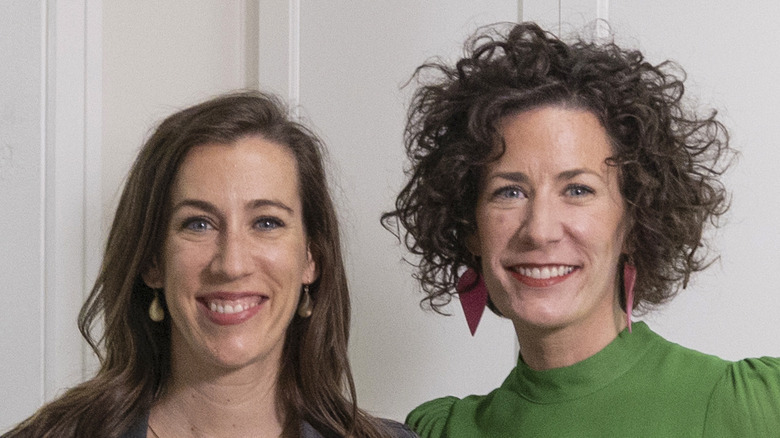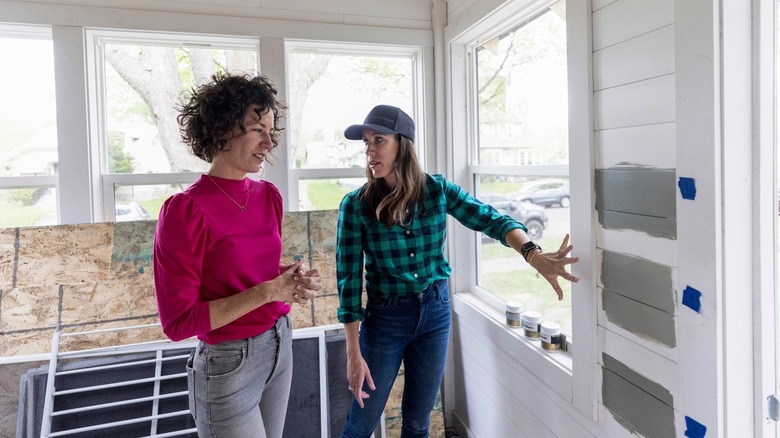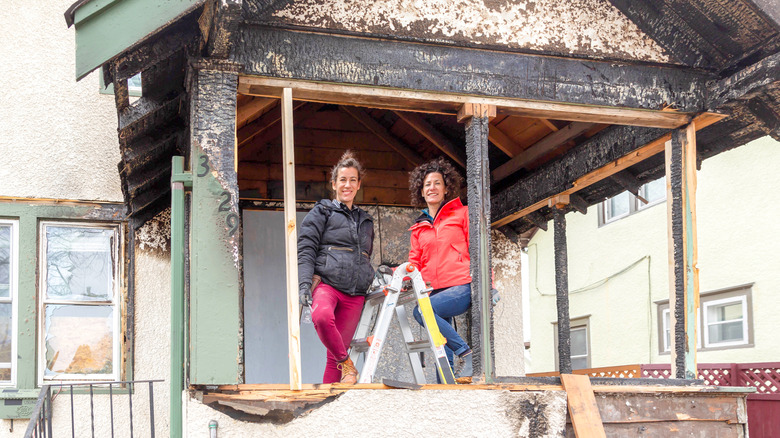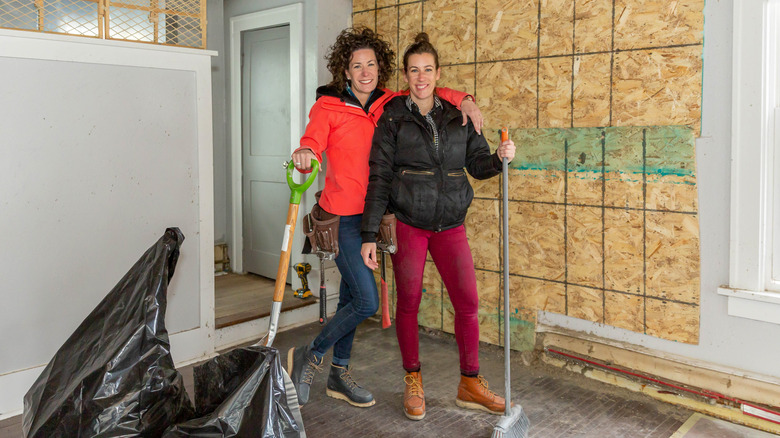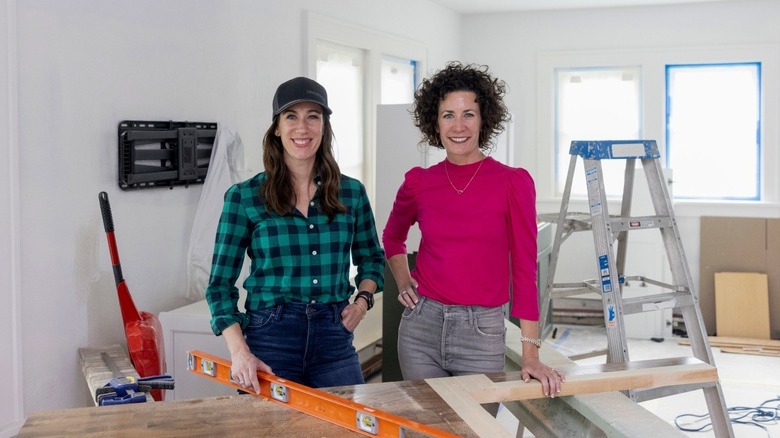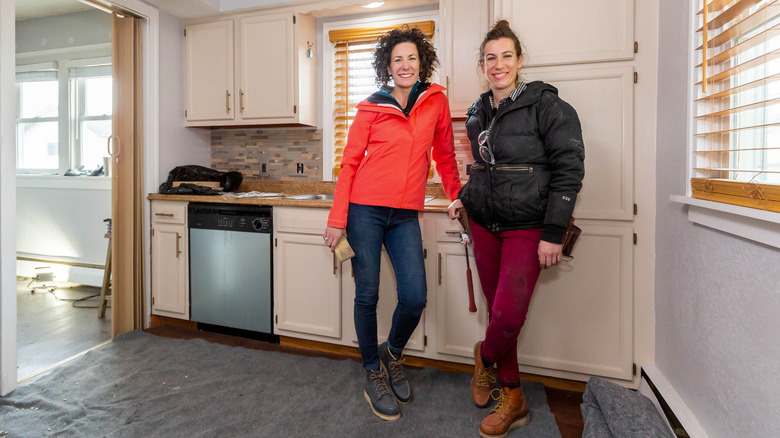Lindsey Uselding And Kirsten Meehan Tackle Home Disasters In Renovation 911 - Exclusive Interview
Making the decision to renovate your home is stressful by itself, but having the decision forced upon you by an unexpected home disaster is a whole new ballpark full of chaos and high emotions. It may not be something you think about in your day-to-day life — until something falls on your house following a windstorm, your pipes burst, a tornado damages your roof, and so on. Having a great and highly knowledgeable team to expertly handle and navigate the difficult terrain can make all the difference, and in HGTV's newest program, "Renovation 911," sisters Lindsey Uselding and Kirsten Meehan do precisely that.
The show follows the sisters and coworkers as they respond to emergency home disasters, including fires, floods, and even a car crashing through someone's front window. In an exclusive interview with House Digest, the breakout HGTV co-hosts told us all about their company, extensive experience in the industry, family background, and expert advice for dealing with your own personal surprise home disasters, plus how to prepare for worst-case scenarios.
Disaster-proofing your home
What are some of the home features — like the steel garage doors mentioned in the 1st episode — that you would recommend homeowners have in their house for disaster-proofing?
Lindsey Uselding: We have a lot of tips and tricks. We actually started a new business called Practical Home that is geared around all the prevention and safety features you can do in a home to prevent these disasters. Where[as] our construction company responds to disasters and is very emergency based, Practical Home is prevention based.
The steel rated door, by code in Minnesota, is something that we have to put in every home, especially after a renovation. The other pieces we recommend — there's water lines throughout everybody's homes, and a water disaster is probably the most frequent disaster we get in our business. [Make] sure, walking around your home, looking at all the different connections, if you see corrosion built up—
Kirsten Meehan: We're talking dishwashers, fridges, toilets, sinks. That's the biggest cause for emergency needs in a home.
Uselding: The other one is for fires. [Make] sure that your smoke alarms work. A lot of them are hardwired, so if your power goes out, make sure that the battery in all your smoke alarms works. You have a battery backup in most smoke alarms. Test them every year so you have peace of mind that if anything happens, you'll be warned.
Meehan: And if you hear a smoke detector chirping, don't just take out the battery so it's not annoying; you have to go get a new battery. Nine volts are not easy to find. A lot of them are now made with regular AAs or AAAs. Definitely replace that battery because you need those smoke detectors working.
Working with insurance
Working closely with insurance, what advice do you have for families experiencing home disasters for a smoother insurance claim process?
Uselding: The most important thing you can do is find a contractor that you know and trust. A lot of times, you may not have experienced an insurance claim and you wouldn't have sought out a restoration contractor, but asking family, friends, neighbors — that goes a long way [toward] finding a restoration contractor. We don't recommend someone who knocks on your door or who shows up randomly. Make sure you can partner with your insurance agent and see if they have any preferred contractors. Find a contractor that you trust [and] you have a great relationship with because you are in a relationship for however long it takes to repair the damage to your house.
Do you have any particular red and/or green flags for contractors?
Meehan: If a contractor has never done a fire loss before, I would highly recommend finding a contractor that is a specialist in fire repair damage. Our biggest thing when it comes to fire damage is we can't move somebody back in if their house still smells, and when you cover up walls and if you don't do all of the necessary steps to alleviate that stink, it's going to be bad news for everybody. So [look for] experience in the industry.
Uselding: That's a good one.
How heavily does working in tandem with insurance companies limit the scope of what you're able to get done, both creatively and more practically?
Uselding: Insurance covers like for like, so this is not something that's a barrier for us. We do this every day, day in and day out. If you had granite countertops, you get granite countertops. If you had backsplash, you get the equal backsplash back. You get like for like, and if you want to contribute money above and beyond, that is totally up to the homeowner. A lot of times, our clients do that because now's the time. The room, or even possibly the house, depending on the size of the disaster, is in disarray.
Meehan: You can be in the middle of a remodel even though it's an insurance claim. At that point, if you always want[ed] to take down this wall, now's the time to do it because there's already a mess. Mentally prepare for it to take as long as it's going to take because you're already in the insurance claim. We do recommend making the changes while it's happening, even though you weren't prepared for this disaster to happen.
Uselding: If you make too many changes and it extends the timeline of what the normal insurance claim is covering, you would have to pay to be out of your house longer. But there are definitely times to take advantage of an opportunity.
Family and filming
Working together as sisters and also following in the footsteps of your dad, how important is family to you and your work life, especially working so closely with other families when you're restoring their homes?
Uselding: Some of our earliest memories were going to job sites with our dad. He's been in this industry since we were born, so it's part of our DNA.
Meehan: We can't imagine doing anything different. Lindsey and I have shared a room our entire lives, so we've been ridiculously close forever and ever. Working with her is actually the biggest reward. We do very different things in our careers. We have different opportunities and different strengths, so we complement each other really well. When we move families back into their home, it's so rewarding because we know what it's like to be part of a very special home, and to get people back into that is pretty special.
What was it like having your process filmed? Did that alter anything about your usual procedure, having a film crew around?
Meehan: It's different having cameras follow you wherever you go.
Uselding: It's really cool to be able to share with the country what we do. Restoration is a unique niche within the construction industry, and we try to show our restoration expertise. I wouldn't say we do anything different — we work within the schedule that's set out by the project managers. We work within the timelines we have, stated by the insurance company. The biggest piece that's different is that sometimes we have to say things three or four times because they want three or four different takes — close, far, medium. That is the biggest difference — repeating ourselves over and over.
Meehan: But like we said, we put houses back together, so this is our business. It's Ungerman putting these homes back together; it's our subcontractors; it's our employees. We feel pretty special to be able to showcase what our team does.
Uselding: We do prepare our clients. We say, "Are you interested?" If they are interested, there's a casting process that happens, and they're very made aware [that] when we come, it's not just going to be Kirsten and Lindsey coming; it's going to be the group surrounding us, the camera, the sound, all of that.
Meehan: It's a bit of an entourage when we arrive.
Navigating high emotions
Emergency renovations are certainly more emotionally charged and involved than a simple home upgrade. How do you navigate those high emotions with clients, especially in cases where features are irrecoverable or irreplaceable?
Uselding: It's a real emotional process, getting them when they're at their most distressed [and] don't know what to do. That's the beauty, though — being able to calm them down, almost [like a] therapist, to get them through this tragic event. We do all their content — we not only pack out the items that are salvageable, we clean them all so that when we do move them back in, they do have some of their items that are coming back home. So I [navigate high emotions by] being able to show compassion, empathy, and then handing the baton over to Kirsten.
Meehan: Then once Lindsey's talked to them about the process and they've gotten their head around it all, we get to start talking about the fun stuff and making it beautiful. It's pretty incredible, and people are like, "Wait, I can change my paint color!" That in and of itself gets people so happy. It is a roller coaster of emotions — there are highs, there are lows, but they start to see a turning point when things start to go back into the house.
Uselding: In the end, our reveals—
Meehan: It's incredible.
Uselding: Kirsten and I have always ensured that we put the home back better than it was. That's our goal. The other piece is giving them something special at the end of every major job. That's really important to us too.
Fun stories from filming
What is one of the wildest or most intense restoration projects that you've taken on?
Meehan: Episode 1 shows a car crash that went through the front of a house in the middle of the night. Thank goodness there were no bedrooms in the basement where anyone was sleeping, but that was pretty crazy, to get that call and they're like, "There's a car in our lower living room." We're like, "Okay."
Uselding: The crazy thing is, our production company said, "If there is ever a time where you get a call and you're like, 'This is something we haven't experienced in 25-plus years,' you need to call us." This was one of those times, and they literally had cameras and sound out there in 30 minutes.
Meehan: [They came] to meet us because they didn't want to miss it. That's a pretty amazing transformation, right on Episode 1.
What are some of your favorite moments from filming or any fun stories from set?
Meehan: One really fun story is [when] the entire crew got different sweatshirts, but they all matched, but they were all different colors. Everybody went to the link on Amazon and picked their favorite color, and we showed up to set one day, and these two people matched, and these two people matched.
You have to bring a little levity to these situations because it's long hours and putting a house back together is hard work; there's a lot of selections to make; there's a lot of planning. That was one highlight I'll never forget, when all 12 of us are wearing the same sweatshirt and you look around and you can't help but smile.
Uselding: The beauty is, [in] one of the episodes, you'll see in multiple scenes people wearing the same but not the same sweatshirt.
Meehan: It's not said, but it was awesome that it made it into [the show].
Do you have anything else you want to share about the show?
Meehan: Tune in; tell your friends; tell your family. It's a great show. It has a different spin than your typical show, and we're very excited to show our company and our world.
This interview has been edited for clarity.
"Renovation 911" premieres tonight, March 28, at 9 p.m. ET/PT on HGTV and will be available for streaming on discovery+.
